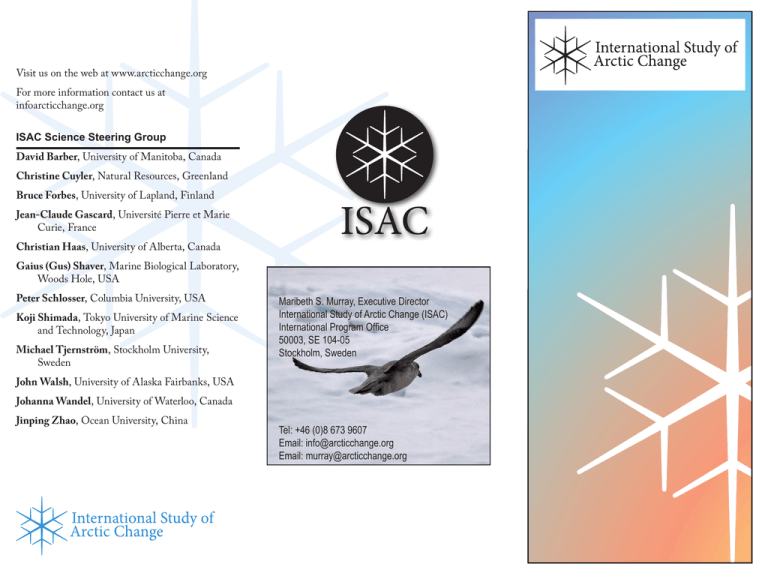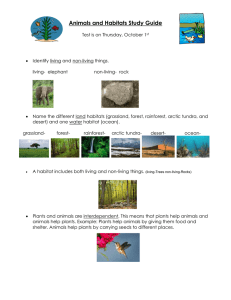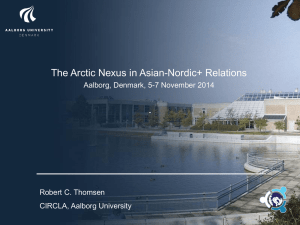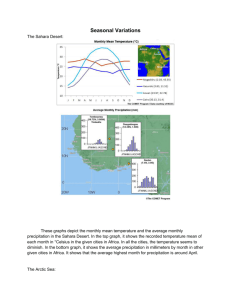Visit us on the web at www.arcticchange.org For more information
advertisement

Visit us on the web at www.arcticchange.org For more information contact us at infoarcticchange.org ISAC Science Steering Group David Barber, University of Manitoba, Canada Christine Cuyler, Natural Resources, Greenland Bruce Forbes, University of Lapland, Finland Jean-Claude Gascard, Université Pierre et Marie Curie, France Christian Haas, University of Alberta, Canada Gaius (Gus) Shaver, Marine Biological Laboratory, Woods Hole, USA Peter Schlosser, Columbia University, USA Koji Shimada, Tokyo University of Marine Science and Technology, Japan Michael Tjernström, Stockholm University, Sweden Maribeth S. Murray, Executive Director International Study of Arctic Change (ISAC) International Program Office 50003, SE 104-05 Stockholm, Sweden John Walsh, University of Alaska Fairbanks, USA Johanna Wandel, University of Waterloo, Canada Jinping Zhao, Ocean University, China Tel: +46 (0)8 673 9607 Email: info@arcticchange.org Email: murray@arcticchange.org The ISAC Science Plan provides a vision for integrating research among diverse fields and varied users and stakeholders. ISAC facilitates international cooperative efforts to understand the Arctic System and all its components on a panArctic scale. ISAC works to sustain and further develop research, coordination, and outreach activities that were initiated over the past several decades and enhanced by the International Polar Year 2008-2009 (IPY). An active science program, ISAC stimulates and provides guidance to develop, maintain, and evolve observational activities and scientific understanding. This approach ensures a legacy of high-level arctic environmental change science and science for society in the decades to come. ISAC was initiated by the International Arctic Science Committee (IASC) and the Arctic Ocean Sciences Board (AOSB). Present and past partnerships include the U.S. interagency program Study of Environmental Arctic Change (SEARCH), ArcticNet Network of Centers of Excellence Canada, and the EU supported Developing Arctic Modeling and Observing Capabilities for Long-term Observation (DAMOCLES) among others.The ISAC International Program Office is hosted by the Swedish Polar Research Secretariat at the Royal Academy of Sciences (Kungliga Vetenskapsakademin), in Stockholm, with current support from the Swedish Research Council (Vetenskapsrådet), the U.S. National Science Foundation and the International Arctic Research Center. Visit us on the web at www.arcticchange. Photo by Nathaniel Wilder The International Study of Arctic Change (ISAC) is a long-term international scientific research program designed to understand the future state of the Arctic System under anthropogenic stress. The driving force behind ISAC is the need to provide scientific information on arctic environmental change to inform strategies for responding to change and decision-making among diverse stakeholder groups. ISAC extends the study of the Arctic from basic science to real world problems on a changing planet. ISAC encompasses panArctic system-scale multidisciplinary observational, synthesis and modeling activities in order to provide an integrated understanding of Arctic Change and projections for future change. Royal Swedish Academy of Science, Stockholm


